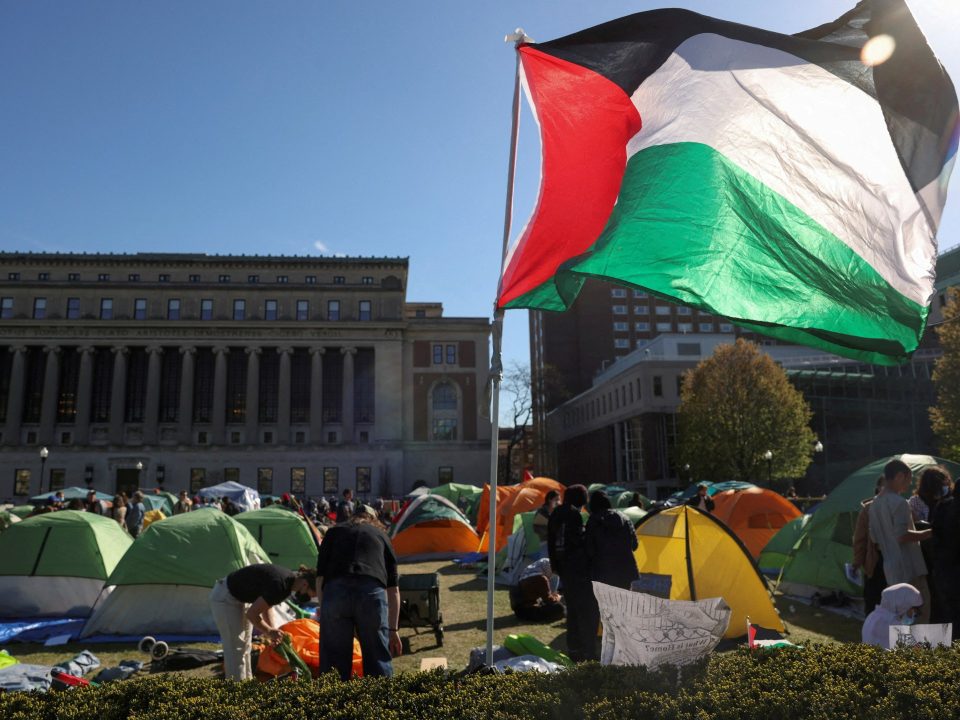Washington DC – A protest movement targeting the Gaza Strip in the United States has highlighted a generation gap in Israel, experts say, with the willingness of young people to challenge politicians and college administrators on display across the country.
The gulf in opinion — with younger Americans generally more supportive of the Palestinians than generations before them — poses a risk to 81-year-old Democratic President Joe Biden's re-election chances, they say.
It could also jeopardize the bipartisan support Israel enjoys in Washington.
“We're already seeing evidence of a generational divide on Israel, and that's going to be a long-term problem for the Democratic Party,” said Omar Wasow, an assistant professor of political science at the University of California, Berkeley.
“These protests are accelerating this generation gap,” Wasow told Al Jazeera.
Students at Columbia University in New York set up a Palestinian solidarity camp last week and have since faced arrest and other disciplinary action after school officials called on police to clean up the protest.
Despite the crackdown, however, similar camps have sprung up across the United States, as well as in other countries.
Footage of students, professors and journalists being forcibly detained by officers on various campuses sparked outrage but did nothing to slow the momentum of the protests, which continue to spread.
“Inflection Moment”
Students are largely demanding that their universities disclose their investments and withdraw all funding from arms manufacturers and firms involved in the Israeli military.
Politicians from both major US parties, as well as the White House and pro-Israel groups, have accused the students of inciting anti-Semitism – charges the protesters vehemently deny.
Eman Abdelhadi, a sociologist at the University of Chicago, said younger people are increasingly frustrated with the status quo on domestic and foreign policy issues.
“I think there's a real dissatisfaction with the older generation, but more importantly with the system they're running,” Abdelhadi said.
She added that the protests mark an “inflection point” in American public opinion more broadly.
“In American history in general, big shifts in public opinion have either coincided with or been triggered by big student movements,” Abdelhadi told Al Jazeera.
She said campus activism can be the basis for political change. “There's a sense that this is the future.”
Biden's plight
For years, US opinion polls have suggested that younger people are more likely to sympathize with the Palestinians and criticize Israel.
But Americans have generally become more critical of Israel's treatment of Palestinians, including the ongoing war in Gaza.
Multiple polls suggest a majority of American respondents support a permanent ceasefire in the besieged Palestinian enclave, where Israel has killed more than 34,000 Palestinians since the conflict erupted on October 7.
But Biden maintained firm support for Israel, the US's biggest ally in the Middle East, throughout the war.
The 81-year-old president's stance could be politically costly as Biden faces a tough re-election in November's election, which is expected to pit him against his Republican predecessor, Donald Trump.
Polls suggest Biden will have to appeal to his Democratic Party base, which is not as united in its support for Israel as the Republican Party.
Angus Johnston, a historian of American student activism, explained that the generation gap on Israel is particularly pronounced among Democrats.
“Nationally, we've seen this for some time as a disconnect between the values of young voters and the majority of Democratic politicians,” Johnston told Al Jazeera.
“And what we're seeing now is a similar disconnect between young people on campus and many of the administrators who run those campuses, along with alumni and donors.”
Sociologist Abdelhadi added that law enforcement's heavy-handed approach to solidarity protests in Gaza undermined Democrats' argument that electing Biden would protect the nation from Trump, whom they accuse of authoritarianism.
“The reality is that Democrats are telling us that young people need to save democracy and that people of color need to save democracy and that any quibbles with this current administration need to be put aside to save democracy,” she told Al Jazeera. .
“But where is the democracy when state police beat students and teachers for protesting and the White House says nothing about it?”
Wasow also said protests and crackdowns against them could increase apathy toward Biden.
“Democrats can't really afford to give people more reasons to vote against Biden, and this is actually happening.”
Policy change
However, student protesters do not engage in American partisan politics. Instead, they emphasized that their demands were intended to help protect the human rights of Palestinians.
So can the demonstrations help change US policy and achieve their divestment demands?
Historian Johnston said it's unlikely America's colleges will divest from big business and the defense industry anytime soon, but the call for transparency in their investments is reasonable.
He added that long-term change is possible, but it won't happen overnight.
“Time and time again, we've seen student organizations change policy, not always quickly and not always in the way students would hope,” Johnston said.
“However, we see that when student organization reaches a certain level of intensity, it can have a significant impact.”
For example, he said, college activism against apartheid in South Africa began in the 1950s and grew over the years.
“I think there's no question that campus organizing against apartheid in the 1980s was a significant part of what shifted American popular and political opinion about the South African regime,” he said.
Wasow, who studied civil rights protests in the 1960s, also said that demonstrations can change public opinion, help form political coalitions around a cause and build civic capacity to advocate for an issue.
“If what's happening now doesn't lead to any policy change, but leads to a generation of young people developing some kind of civic capacity around activism on these issues, I think that would have long-lasting effects.”

